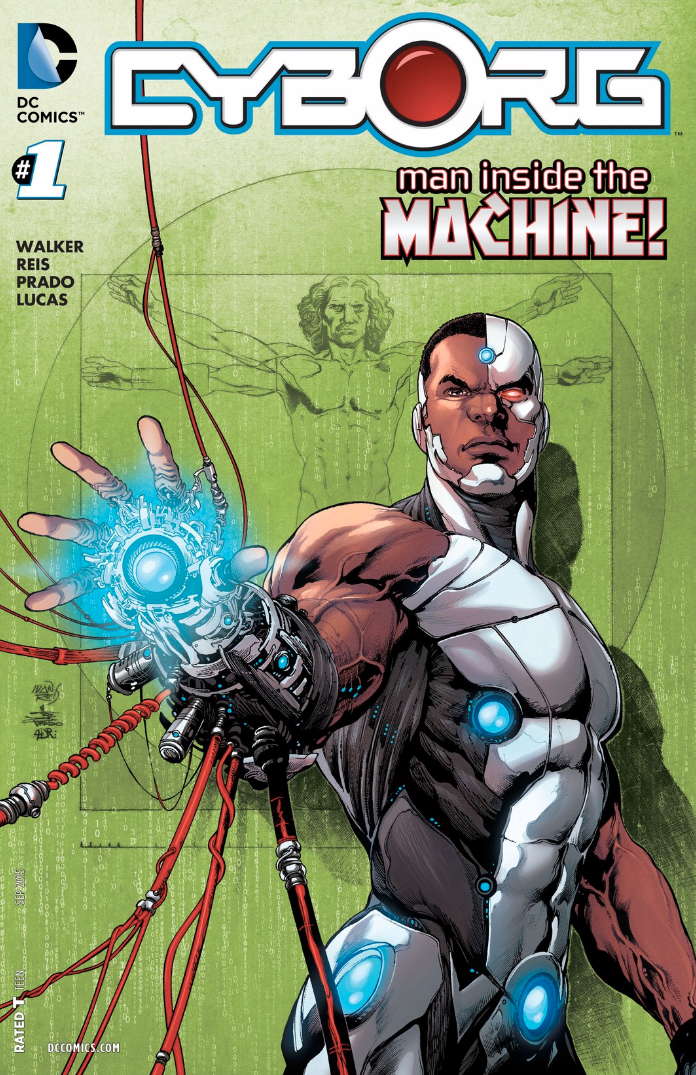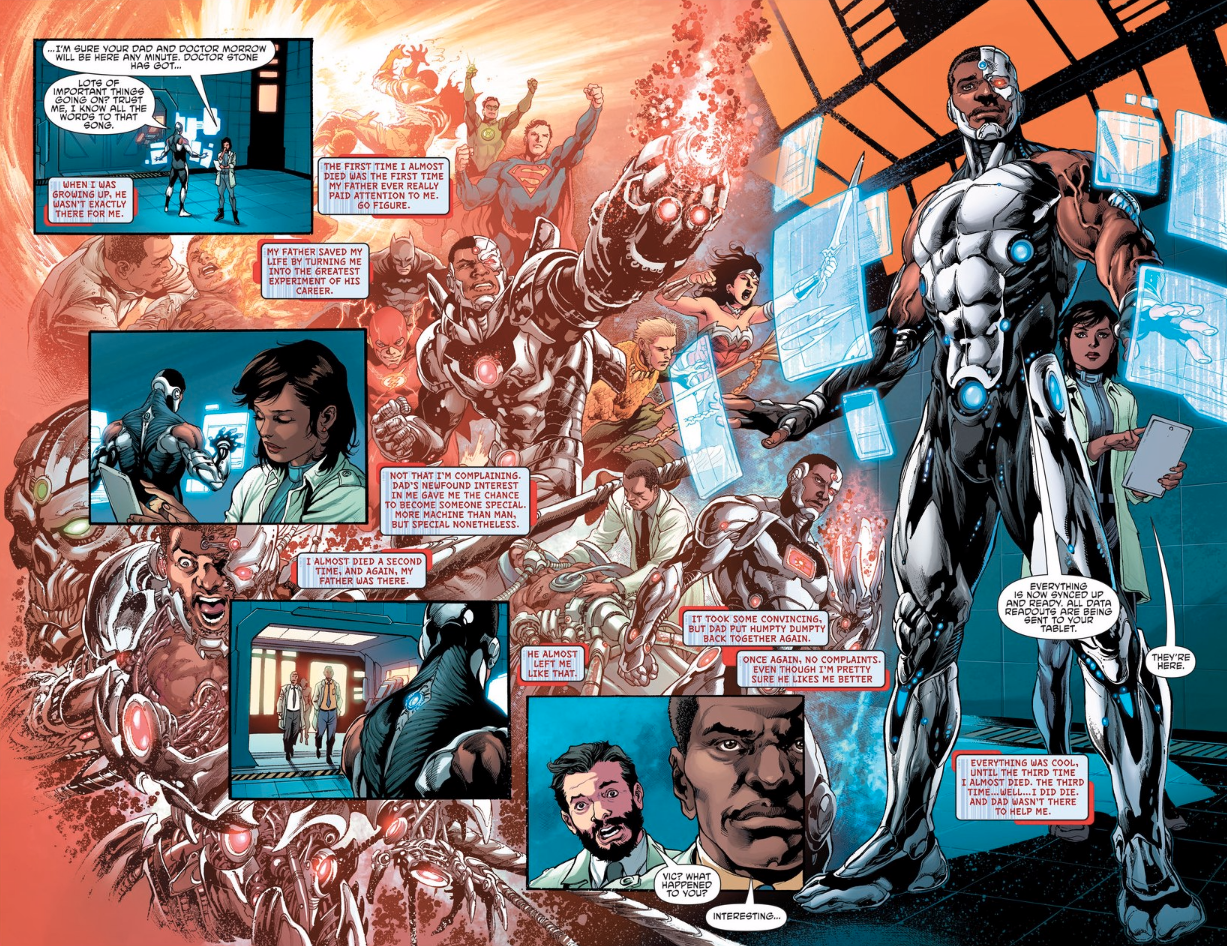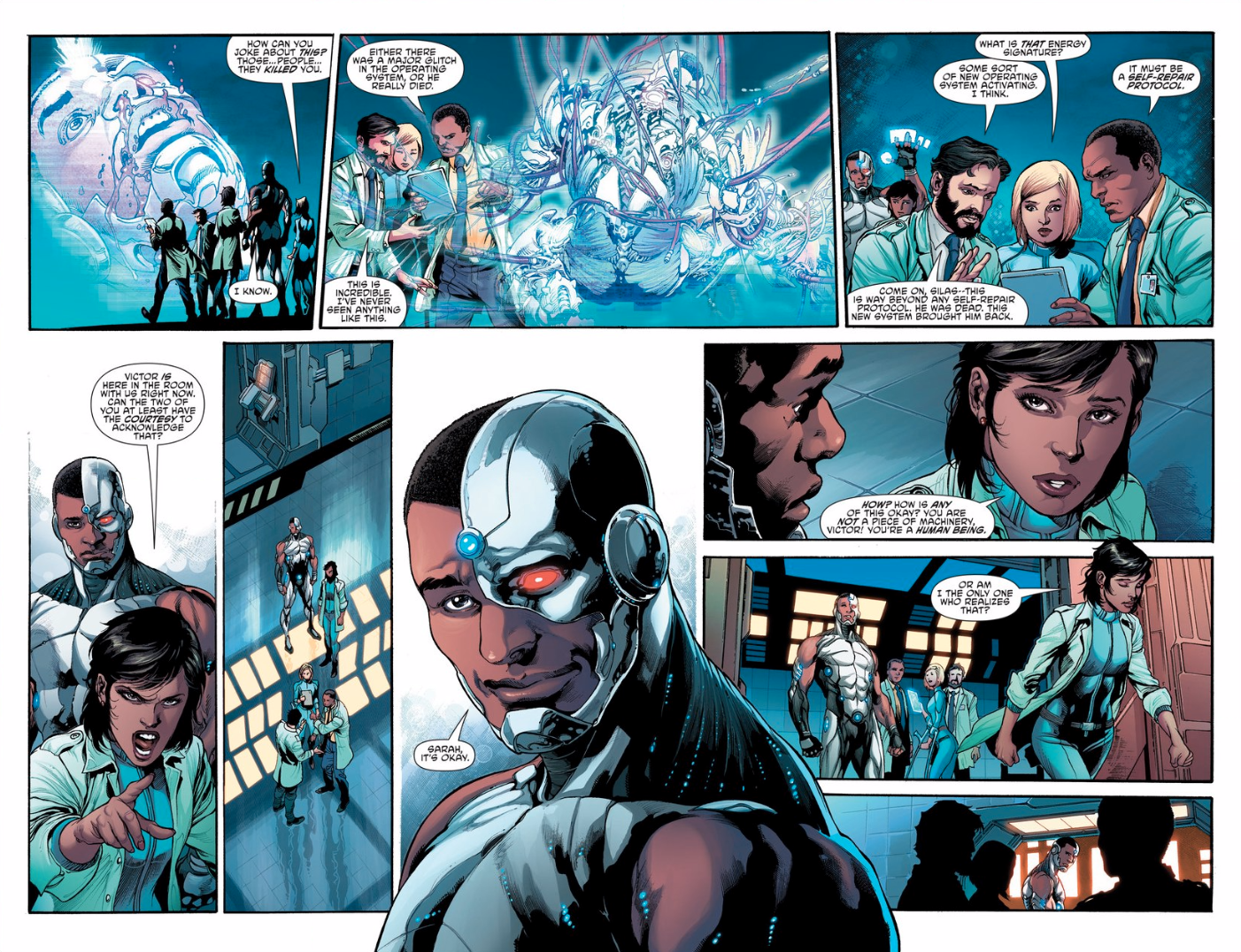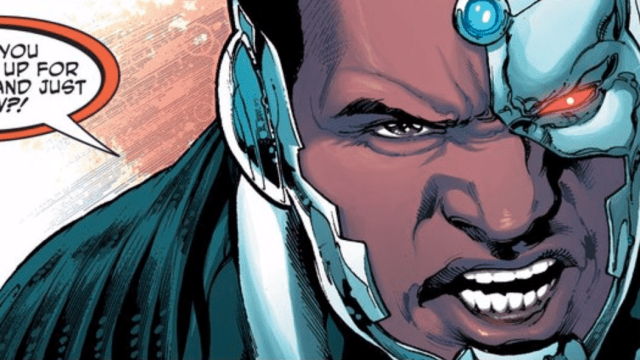I’ve always had a hard time with Cyborg. I wanted to like DC Comics’ bionic superhero but something’s always held me back from digging Victor Stone the same way I like, say, The Black Panther or Robin. That started changing this week.
When I first encountered Cyborg in the old New Teen Titans comic, I was simply happy that there was a black character on the team. I grew up wanting — and still do want — more faces that looked like mine in the pop culture that I read and watch. I enjoyed Cyborg and Beast Boy’s rival-brothers banter but, overall, the character felt like a second-tier persona.

Much of the character’s history has linked his black body — what’s left of it, anyway — to trauma and tragedy. While there’s been a lot of suffering in the Black American Experience, that’s not all it’s been. The storylines that have centered on Victor have — unconsciously, it seems — tended to echo on sadness, deprivation and feeling less-than-human. He was grumpy. A lot. Worse still, he’s always seemed disposable, an easy sacrifice in dramatic storylines because he can be rebuilt with low suspension of disbelief. Even in superhero fiction where death and resurrection happen often, there’s not as much at stake when you know a character can get refashioned over and over again. That constant recycling and his seemingly permanent maladjustment has made Victor Stone feel less human.

The guy writing the new Cyborg comic book series clearly gets all that. In the first issue that’s out this week, David Walker, who is black, has Cyborg talking about his fraught relationship with his scientist father. Silas Stone is a man who cares most about how his son’s bio-mechanical body works than how his son actually feels.
Cyborg #1 connects to/follows/precedes a recent story in which Victor died on a Justice League adventure only to return with a mysteriously upgraded body. This issue shows Cyborg coming home to his dad’s STAR Labs facility to make sense of his rebirth. It also gives a glimpse of two interstellar factions fighting a war with advanced technology, teasing an eventual connection to Cyborg’s new status quo. But the main draw here is reading a version of Cyborg who deals with the existential crisis of being a hybrid of man and machine without being in mope mode for 90% of his on-panel time. He’s a guy who jokes about being dead; he’s not just angry all the time.

The Cyborg solo book comes at a loaded time, because the diversification of the character and talent pools in superhero comics has been a hot topic. Reactions to the changes made in Marvel’s Thor and Captain America — where the lead roles have been taken over by a white woman and a black man, respectively — have been positive and negative. Nevertheless, Marvel and DC seem to understand that readers who don’t feel represented in the comics they buy can and do choose to spend their money elsewhere. They’re both trying to appeal to a wider fanbase.
Even the most well-intentioned efforts can draw criticism. For example, Marvel editor Tom Brevoort recently caught flack for his quick, dismissive answer about how the publisher’s upcoming hip-hop cover homages square up with the lack of the black talent working at the House of Ideas. Brevoort soon expanded on his answer but the heated aftermath shows how the feedback loop between comics-makers and comics buyers is radically different than it was even five years ago. Marvel and DC screw up, the two big superhero shops get their feet held to the fire quickly.
It’s still rare for black writers to work on black lead characters is in mainstream comics, a problem that DC and Marvel say they’re trying to address. DC’s new partnership with Milestone Media — the black-owned company that created Static, Icon, Hardware and other heroes from racially, sexually and economically diverse backgrounds in the 1990s — is clearly part of those efforts, along with the new We Are Robin series.
It didn’t really feel like Cyborg was a token in the New Teen Titans because that’s where his origin happened. But, every time Cyborg’s been bumped up to a bigger spotlight, it’s been hard to shake the idea that he was there to integrate the spaces where he was showing up. A version of Cyborg showed up on the Smallville TV series, as one conspicuously brown face guest-appearing in an otherwise very pale superhero show. DC potentate Geoff Johns made him a central figure in the Flashpoint reality that temporarily replaced an older version of the DC Universe. In that universe, he was America’s greatest superhero, elevated to the spot usually held by Superman. Then, when DC did its New 52 reboot in 2011, Victor Stone became part of the publisher’s premier super-team when a new version of Justice League launched four years ago. And a constant stream of rumours hint that he’ll be part of the DC Cinematic Universe in planned Cyborg and Justice League movies.
It’s an important moment for Cyborg. He’s got a past where he could be dismissed as a token and a possible future where that accusation could happen again. It’s encouraging that, right now, he’s starring in a book where he can smile, where he’s surrounded by other brown faces and is committed to figuring his own self out.

Comments
2 responses to “Cyborg Is Going To Be Really Important For DC Comics”
Looking forward to reading this, a lot of the DC You title’s have been great so far and man that Ivan Reis kills it on art! I kinda miss the old, bulky New 52 look though, new costume isn’t doing it for me…
my only real experience with Cyborg is from the Teen Titans cartoon they had on Cartoon Network, and I enjoyed him. Granted that cartoon was never afraid to be a bit silly, or a lot silly depending on the episode, but I always found him enjoyable.